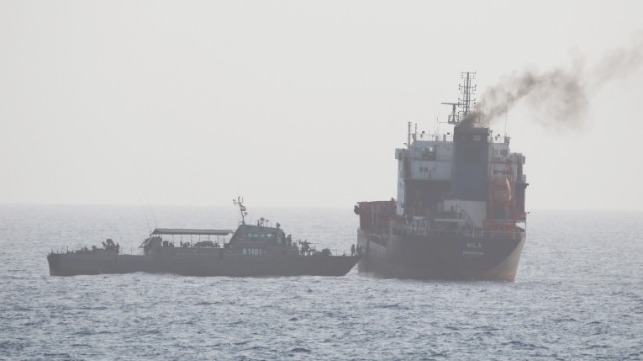Warnings of Increased Security Risk Following U.S. and Iranian Actions

Analysts and the media have all been reviewing the events of the past few days seeking to understand the boarding of a merchant ship by Iranian forces as well as potential ramification for the shipping industry from the United States’ recent seizure of Iranian oil cargo. Sources believe it is becoming increasingly clear than the events were all interrelated raising the danger of further incidents for the shipping industry.
On August 12, Iranian forces were seen boarding the Liberian-flag tanker Wila as it approached the anchorage in the UAE. Reports at the time linked the ship to Greek management and connected the raid to Iran’s shipments of oil. They highlighted the Greek shipping industry’s participation in the shipments as well as later promises to honor U.S. economic sanctions in order to keep Greek vessels off the U.S.’s blacklist. Shortly after the boarding, the U.S. reveals that it had been successful in seizing Iranian shipments of gasoline. Among the vessels transporting the gasoline, the Bering and Pandi, are owned and managed by the same company as the Wila.
A report in today’s Jerusalem Post however casts a different explanation on the events from other analysts. Quoting Samir Madani, co-founder of Tanker Trackers, the newspaper suggests additional elements further complicating the story.
While it has been suggested that the boarding was a retaliatory harassment by the Iranian, the newspaper points out that no distress call was received from the Wila. Tanker Trackers suggested to the Jerusalem Post that the Iranian might have been seeking to confiscate recording devices in an attempt to locate the other Greek-managed ships that were carrying the gasoline shipments. The Wila was later permitted to continue on its course to the UAE.
The uncertainty over the events, and if further retaliatory harassments might be possible caused security analysts Dryad Global over the past few days to rethink its warnings for the shipping industry. Initially, when Dryad reported the Wila incident they said “Iran’s actions today do not raise the overall risk posed by vessels within either the Gulf of Oman or Strait of Hormuz.”
In its latest update, Dryad now says its analysis reveals a heightened risk for all vessels carrying U.S. cargos. Dryad says that during times of increased geopolitical tension that U.S. and Saudi vessels, as well as those cooperating with the two countries or working against Iranian interests, are at risk in the area around the Persian Gulf, Strait of Hormuz and the Gulf of Oman. Dryad, however, continues to believe that the heightened threat level does not extend to the broader U.S. and Greek vessel fleets.

that matters most
Get the latest maritime news delivered to your inbox daily.
In raising its threat level assessment, Dryad warns Iran frequently takes a “tit for tat” approach to its actions. They caution to be on guard for potential attempts to harass vessels in the region and both to be aware of the tactics typically used by the Iranian interests as well as the protocols to deal with an attempt at harassment or effort to impede a ship’s movements in international waters. They also encourage prompt reporting to the appropriate authorities of any suspicious activities or attempts to approach or board a vessel.
